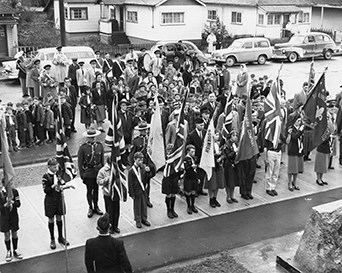Every Nov. 11, Canadians across the country take time out of their day to go to a cenotaph or wreath-laying ceremony or partake in a moment of silence in an effort to honour and remember those self-sacrificing men and women who served in the military and fought in wars.
But for four Squamish residents, it doesn’t take any effort to recall the horrors and chaos of wartime, no matter the time of year, because they were there in the trenches during WWII. Oscar Runzer, James Crombie, Ted Arsenault and Ted Gregoire are all living WWII veterans who call Squamish home. Arsenault and Gregoire each just recently celebrated their 99th birthdays (Oct. 10 and Nov. 4, respectively), and took some time to share their memories of the war, beginning with the infamous D-Day Invasion on June 6, 1944.
“I landed on the beach the day after it started,” said Arsenault, who enlisted at 21 in 1942. “We landed in France at a small beach town called Bény-sur-Mer.”
He remembered exactly how he felt as the troop transport neared the fighting on the beach.
“You feel pretty weak,” he said. “There was artillery going off, people running around and gunfire. We got on the beach and found cover just long enough to be able to go off into the woods.”
That first night in France, Arsenault found himself alone on guard duty near where they had landed.
“I was scared,” he said. “And I remember that night watching German V1 bombers flying overhead. I must have seen about 13 bombers fly overhead that night.”
Gunfire and bombing continued throughout that night, and Arsenault can still clearly articulate the fear he felt in the darkness on foreign soil.
“It was so dark and I was all by myself, and I wondered where the Germans were hiding, and when they would come and get me,” he said. “While I was overseas, I always slept with one eye open after that night.”
He also always knew where the nearest “slit trench” (a narrow shallow trench dug during combat for the protection of a single soldier or a small group of soldiers) was located, as German forces continuously dropped bombs and artillery shells on the allied forces.
“There were constant raids at night by German bombers,” he said. “You never knew where the bombs were going to land, so you’d run and throw yourself into a little slit trench… and hope, I guess. One night I jumped in right on the head of a Sgt. Major.”
Later, he would join the advance through France, marching for 56 straight days across the war-torn countryside, fighting the enemy in casualty-filled battles along the way, and aiding in its liberation; an act for which he was later decorated by France.
Gregoire was also part of the D-Day Invasion at Normandy, however, he ended up experiencing a different side of the conflict as a prisoner of war (POW).
“I was with the Royal Winnipeg Rifles, and my regiment was one of the first on the beach,” he said, clearly recalling the terror and horrors of that fateful day. “We had to step over the dead to make it to the beach. And really, the only thing going through your mind at the time is to not get killed. There was no time to think of anything else.”
One of his first tasks after making it safely off the beach was to aid in eliminating a German pillbox equipped with a machine gun that was shredding up the landing zone.
“We were trying to take it out by approaching along this winding path,” he said. “But, another regiment with tanks was also firing at the same pillbox.”
Gregoire said he and the other men dove to the ground to avoid the tank shells, scraping his nose on the boot heels of the lance corporal on the ground in front of him.
“One of the tank shells hit a concrete wall, and the spray of all the concrete, hit us, taking half of the lance corporals head off. He died in my arms,” said Gregoire. “It just goes to show how close some of us came to dying. And this was all in the first five or 10 minutes of landing.”
He later captured three German soldiers from that pillbox and led them down to the allied camp for processing.
“Later, I fell asleep in a slit trench, and woke up to a gun pointed in my face,” he said. “We had been found by the Germans, who searched us and then marched us out to a road, and into occupied France. So, that was the end of fighting for me.”
For days, passing by the corpses of animals and soldiers alike, the POWs were marched through the countryside, pausing occasionally at barns along the way, until they were loaded onto boxcars for the trip to Germany and a POW camp.
“I was at Stalag 4B,” he said, adding he spent his time at the camp working in a brick factory. “When you are in the camp, you feel helpless. If you make the wrong move or say the wrong thing, you get a bullet in the head. So that is always on your mind.”
Gregoire was eventually freed by American forces at the end of the war and returned home to tell his tale.
Both Squamish veterans say they are fortunate to have survived, and made it to the spry age of 99. They’re also very modest and matter-of-fact about the experience.
“We had a job to do,” said Arsenault. “So, we went over there and that’s what we did.”




